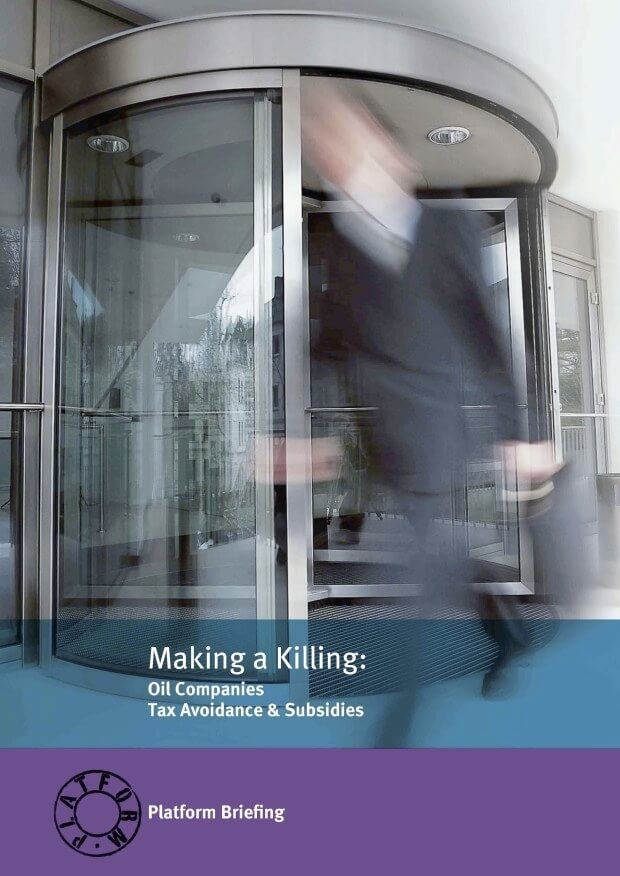Yesterday, The Observer ran a story about George Osborne promising to crack down on multinationals avoiding tax in some of the world’s poorest countries. Anger over corporate tax avoidance at a time of massive cuts to public spending has placed the issue on the political agenda, especially since widespread popular protest sparked by UK Uncut. The money lost due to tax avoidance by large companies (such as high street brands Vodafone, Topshop and Starbucks) could reduce or entirely remove the need for cuts to public spending, demonstrating that austerity is a political decision and not based on an economic imperative.
Now, a Platform briefing Making a Killing illustrates how oil company mega-profits are also being made at the expense of the public purse, as well as the global climate. As UK youth centres shut, hospitals struggle and the queues at food banks grow and, poverty rises in the countries where oil is extracted such as Nigeria, where almost 100 million people living on less than a $1 (£0.63) a day, companies like BP and Shell are holding back billions of pounds in potential tax revenue.
Despite presenting themselves as “British” companies internationally and relying on British government support abroad, BP, Shell and Tullow insist that they will only pay tax on profits that they deem to have made directly in the UK. UK tax bills are minimised by separating and reconstituting their companies around the globe, locating particularly high value operations in tax havens. For example, while Shell’s global profits increased by 25%, it cut its payments to HMRC by 18%
As well as making huge profits at the expense of the UK public purse, oil companies do everything they can to minimize paying tax in countries where they extract oil. In 2009, BP was fined $275 million by the Turkish Finance Ministry for evading taxes. Heritage, run by ex-mercenary Tony Buckingham, tried to dodge paying capital gains tax on a $1.45 billion sale of its Ugandan assets to Tullow in 2010. In Nigeria, oil company lobbying has stalled progress of the Petroleum Industry Bill (PIB) for nine years. The oil majors have been particularly vocal on potentially losing tax exemptions as a result of this law. Shell claims that: “the proposed PIB Joint Venture terms are not competitive when compared with other oil producing countries.”
As well as avoiding tax, UK Oil and gas companies have received a series of lucrative tax breaks. For example, in his 2012 Budget, George Osborne announced new allowances including a £3bn new field allowance for large and deep fields to open up west of Shetland. At the same time, the UK Government has scaled back its support for the renewable energy sector and George Osborne has been demanding cuts of 25% to wind energy subsidies.
Oil and gas companies also receive extensive and preferential diplomatic and political support. For example, Foreign Office (FCO) support was vital to BP obtaining the strongest hand in the key ‘Contract of the Century’ in Azerbaijan in 1994, which has underpinned the company’s pivotal position since. Responding to specific requests by BP, the FCO organised visits to Azerbaijan for high-profile UK political figures at strategically important moments, such as the 1993 visit of former Prime Minister Baroness Thatcher. Disclosure from freedom of information requests show the foreign minister at the time, Douglas Hurd stated “there were some parts of the world, such as Azerbaijan and Colombia, where the most important British interest was BP’s operation. In those countries he was keen to ensure that our efforts intertwined effectively with BP’s.”
The UK government (among others) faces a stark choice. It can either continue its diplomatic support for oil companies, pandering to their ever growing demands for tax relief and other subsidies, while further investing in an economy locked into fossil fuel extraction or it can ensure that fossil fuel companies pay taxes in full and honour its decarbonisation commitments by providing support for clean energy development instead. Its actions will show whether it really is the government of the 1%.
